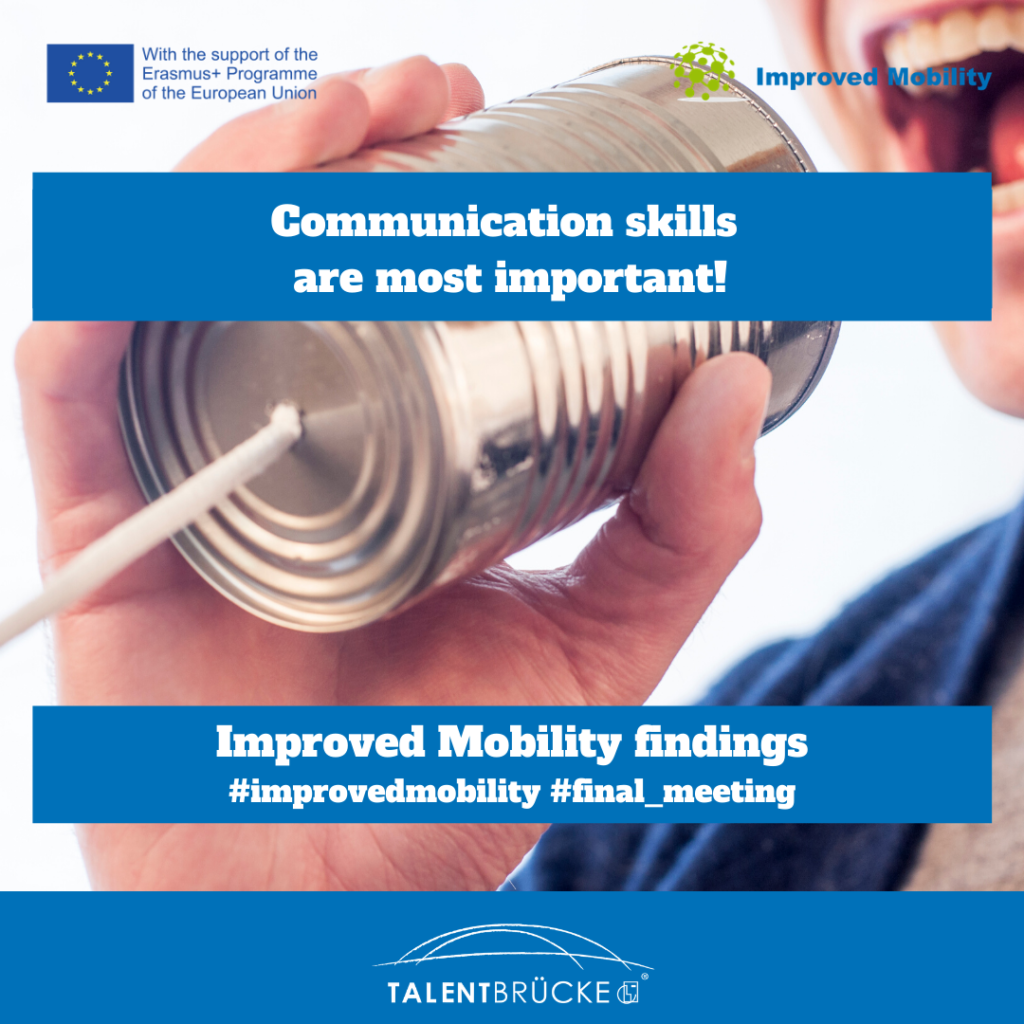


English below
Ziel des Projekts „Improved Mobility“ war es, Faktoren zu identifizieren, die es ermöglichen die Wahrscheinlichkeit einer erfolgreichen Mobilität von Auszubildenden in Europa zu messen.
In den letzten Jahren ist die Mobilität für die Berufsbildung immer wichtiger geworden und verschiedene Institutionen haben erkannt, dass Auslandsaufenthalte während der Berufsausbildung eine sinnvolle Ergänzung darstellen. Doch wie entsteht erfolgreiche Mobilität?
Wir stellten uns die Frage: Was sind die Faktoren für eine erfolgreiche Mobilität?
Die EU setzte einen Zielwert von 6 % fest, d.h. 6 % der Auszubildenden in Europa sollten einen Teil ihrer Ausbildung im Ausland verbringen. Die Regierung der Bundesrepublik Deutschland beispielsweise setzte sich ein noch ehrgeizigeres Ziel von 10%. Doch tatsächlich lag im Jahr 2015 die Rate bei lediglich 4%. Maßnahmen, die diese Rate erhöhen sollten, erscheinen daher sinnvoll.
Im Rahmen dieses Projektes wurde herausgearbeitet, welche Faktoren eine erfolgreiche Mobilität begünstigen. Hierzu wurden drei verschiedene Personengruppen mittels Fragebögen befragt.
Die erste Gruppe bestand aus Personen, die sich für Mobilität interessieren. Mit Hilfe der Umfragen konnten sie ihre wichtigsten Persönlichkeitsmerkmale herausfinden, reflektieren und damit prüfen, ob Mobilität für sie sinnvoll erschien.
Die zweite Gruppe bestand aus Personen, die sich derzeit im Ausland aufhielten. Sie lernten mehr über sich selbst und konnten ihr Selbstvertrauen schärfen. Dinge, die in der Mobilität gut oder schlecht funktionieren, wurden greifbarer und es konnten Lösungen für Probleme gefunden werden. Diese Gruppe wurde von den Mitgliedern des Projektkonsortiums befragt. Ein großer Teil der Projektpartner verfügte über umfangreiche Erfahrungen in der Betreuung von Menschen, die Mobilitätsprojekte wahrnehmen.
Die dritte Gruppe bestand aus Personen, die einen Auslandsaufenthalt mit einem der Projektpartner abgeschlossen hatten. Diese Menschen wurden auch nach ihrem subjektiven Erfolgserlebnis befragt.
Aus der Evaluation der jeweiligen Fragebögen wurden im Anschluss Faktoren für erfolgreiche Mobilitäten abgeleitet und diese potenziellen Zielgruppen zur Verfügung gestellt.
Wir glauben, dass Mobilität in einem zunehmend globalisierten Europa ein absoluter Mehrwert für junge Menschen ist, um ihre Erfahrungen und Fähigkeiten zu internationalisieren und damit wettbewerbsfähig zu entwickeln. Die ganzheitliche Betrachtung von Erfolgsfaktoren im Rahmen von Mobilitätsprojekten für verschiedene Zielgruppen, vor allem aber für Zielgruppen aus dem Bausektor, war der innovative Ansatz dieses Projektes. „Improved Mobility” lief unter der Leitung der TALENTBRÜCKE GmbH & Co. KG und wurde gefördert durch das Programm Erasmus+ der Europäischen Union.
Das Projektkonsortium bestand aus Mitgliedern aus Deutschland, Spanien, Litauen, Italien und Belgien.
- TALENTBRÜCKE GmbH & Co. KG (Cologne/Germany)
- Lux Impuls GmbH (Munich/Germany)
- Berufsförderungswerk der Bauindustrie NRW gGmbH (Kerpen/Germany)
- Centro Edile A. Palladio (Vicenza/Italy) – heute: Scuola Costruzioni Vicenza Andrea Palladio
- Viesoji istaiga Vilniaus statybininku rengimo centras (Vilnius/Lithuania)
- International Formation Center S.L. (Madrid/Spain)
- Centre IFAPME Liège-Huy-Waremme ASBL (Liège/Belgium) – heute: Centre IFAPME Liège-Huy-Verviers
Programm: Erasmus +
Hauptaktion: Innovation und Austausch bewährter Verfahren
Aktion: Strategische Partnerschaften
Hauptziel des Projektes: Austausch bewährter Verfahren
Beginn: 01.10.2018
Ende: 31.03.2020
Dauer: 18 Monate
Endergebnisse

Wir freuen uns die Ergebnisse des Projekts „Improved Mobility“ präsentieren zu können. Bitte klicken Sie auf die Sprachen, in der Sie das Abschlussdokument lesen möchten:
Vielen Dank für Ihr Interesse!

English Version
The aim of the Improved Mobility project was to identify factors that make it possible to measure the probability of successful mobility of trainees in Europe.
In recent years, mobility has become increasingly important for vocational education and training and various institutions have recognised that stays abroad during vocational training are a sensible supplement. But how does successful mobility come about?
We ask ourselves: What are the factors for successful mobility?
The EU sets a target of 6%, i.e. 6% of trainees in Europe should spend a part of their training abroad. The government of the Federal Republic of Germany, for example, has set itself an even more ambitious target of 10%. In fact, however, the rate was only 4% in 2015. Measures to increase this rate therefore seem sensible.
Within the framework of this project, the factors that support successful mobility were identified. Three different groups of people have been interviewed using questionnaires.
The first group consisted of people who are interested in mobility. With the help of the surveys, they could find out and reflect on their most important personality traits and thus check whether mobility projects makes sense to them.
The second group consisted of people who were currently abroad. They learned more about themselves and could increase their self-confidence. Things that work well or badly in mobility become more tangible and solutions can be found to problems. This group has been interviewed by the members of the project consortium. A large proportion of the project partners have extensive experience in looking after people who are involved in mobility projects.
The third group consisted of people who had completed a stay abroad with one of the project partners. These people were also asked about their subjective sense of achievement.
Subsequently, factors for successful mobility were derived from the evaluation of the respective questionnaires and have been made available to the potential target groups.
We believe that in an increasingly globalised Europe mobility is an absolute added value for young people in order to internationalise their experiences and skills and thus develop them competitively. The innovative approach of this project is the holistic consideration of success factors in the context of mobility projects for different target groups, but above all for target groups from the construction sector.
“Improved Mobility” was developed under the management of TALENTBRÜCKE GmbH & Co. KG from Cologne and funded by the Erasmus+ Programme of the European Union.
The project consortium consisted of members from Germany, Spain, Lithuania, Italy and Belgium.
- TALENTBRÜCKE GmbH & Co. KG (Cologne/Germany)
- Lux Impuls GmbH (Munich/Germany)
- Berufsförderungswerk der Bauindustrie NRW gGmbH (Kerpen/Germany)
- Centro Edile A. Palladio (Vicenza/Italy) – heute: Scuola Costruzioni Vicenza Andrea Palladio
- Viesoji istaiga Vilniaus statybininku rengimo centras (Vilnius/Lithuania)
- International Formation Center S.L. (Madrid/Spain)
- Centre IFAPME Liège-Huy-Waremme ASBL (Liège/Belgium) – heute: Centre IFAPME Liège-Huy-Verviers
Programme: Erasmus +
Key Action: Cooperation for innovation and the exchange of good practices
Action: Strategic Partnerships
Main objective of the project: Exchange of good practices
Project Start Date: 01.10.2018
Project End Date: 31.03.2020
Project Duration: 18 months
Final Results
We are pleased to present the results of the project “Improved Mobility”. Please click on the languages in which you would like to read the final document:


